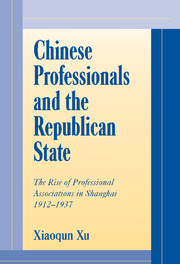 Chinese Professionals and the Republican State
Chinese Professionals and the Republican State Book contents
- Frontmatter
- Contents
- List of Tables
- Acknowledgments
- Abbreviations of Frequently Cited Sources
- Introduction
- Part I Professions and Professionals
- Part II Social Institutions, State Actions, and Professionalization
- Part III Professionalism, Nationalism, and Politics
- 6 From “Literary Men” to Professionals: Shanghai Journalists
- 7 National Essence versus Science: The Medical Profession in Conflict
- 8 Professionalism and Nationalism: The Shanghai Bar Association (I)
- 9 Professionalism and Politics: The Shanghai Bar Association (II)
- Conclusion to Part III
- Conclusion
- Glossary
- Bibliography
- Index
7 - National Essence versus Science: The Medical Profession in Conflict
Published online by Cambridge University Press: 07 September 2009
- Frontmatter
- Contents
- List of Tables
- Acknowledgments
- Abbreviations of Frequently Cited Sources
- Introduction
- Part I Professions and Professionals
- Part II Social Institutions, State Actions, and Professionalization
- Part III Professionalism, Nationalism, and Politics
- 6 From “Literary Men” to Professionals: Shanghai Journalists
- 7 National Essence versus Science: The Medical Profession in Conflict
- 8 Professionalism and Nationalism: The Shanghai Bar Association (I)
- 9 Professionalism and Politics: The Shanghai Bar Association (II)
- Conclusion to Part III
- Conclusion
- Glossary
- Bibliography
- Index
Summary
THE MEDICAL profession in twentieth-century China comprised two major schools: native medicine and Western medicine. The difference between native and Western medicine in philosophy, theory, and technique made a conflict between the two schools almost inevitable, and the conflict was intensified during the Republican period when the professionalization process brought their differences into sharp focus. Chinese practitioners of Western medicine advocated national salvation through science and dismissed native medicine as superstitious, unscientific, and an impediment to the development of medical science in China. On the other hand, native medical practitioners insisted that what they learned and practiced was part of the national essence (guocui) and should be protected against the cultural invasion of imperialism (diguo zhuyi wenhua qinlue), including Western medicine. Both sides used such rhetoric to camouflage the business competition between them, but the rivalry and its implications did point to a cultural conflict between Chinese tradition and Western influence in China's modernization, as Ralph C. Croizier's study pointed out long ago. More recently, studies by Ruth Rogaski and Bridie J. Andrews show how Western medicine was adopted by the state (at the municipal level) as part of the modernization project and how it competed against and negotiated with native medicine in the Republican era.
- Type
- Chapter
- Information
- Chinese Professionals and the Republican StateThe Rise of Professional Associations in Shanghai, 1912–1937, pp. 190 - 214Publisher: Cambridge University PressPrint publication year: 2000


